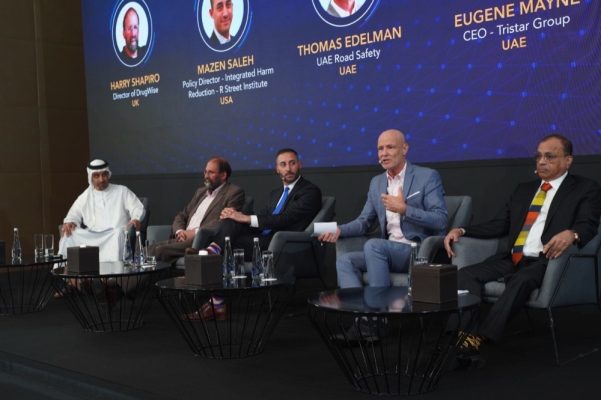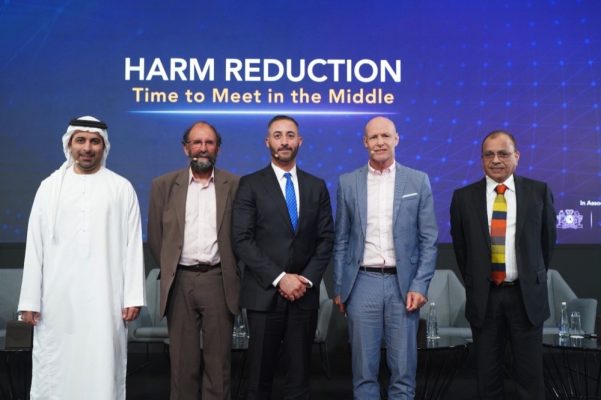POST EVENT PRESS RELEASE
Harm Reduction: Time to Meet in the Middle
“Harm Reduction: Time to Meet in the Middle” addressed the lack of awareness and misinformation of harm reduction in the GCC
Dubai, United Arab Emirates, 8 November 2022: Social responsibility was at the center of discussions during the first ever harm reduction event in the GCC region, “Harm Reduction: Time to Meet in the Middle”, which took place last week at the Conrad Hotel, Dubai, hosted by CNBC Arabia, in partnership with Philip Morris Management Services (Middle East) Limited, and Tristar Group .
The event, titled “Harm Reduction: Time to Meet in the Middle”, saw medical doctors & industry experts, gather together to address the importance of shared social responsibility and how facts & science together with compassion, curiosity, consistency and sustainability play a unified role in raising awareness on the importance of harm reduction, on a regional and global scale.

Three insightful panel discussions explored the concept of harm reduction, how it is applied in real life scenarios, and how advances in technology and science are making harm reduction a possibility. The event also discussed how we can all adopt harm reduction practices to improve our quality of life, alongside much more.
The speakers present included Professor David Khayat, Head of Medical Oncology, La Pitié-Salpétrière Hospital (Paris); Professor Riccardo Polosa, Professor of Internal Medicine, University of Catania, Italy; Nathan Nagel, CEO, Middle East Medical; Harry Shapiro, Director of DrugWise, UK; Dr. Abdelmalik, Family Medicine Consultant, Kuwait; Eugene Mayne, CEO, Tristar Group, UAE; Professor Tara Rampal, Consultant Anesthetist and Public Health Expert, UK; Thomas Edelmann, Founder of Road Safety UAE; and Mazen Saleh, Policy Director, Integrated Harm Reduction, R Street institute, USA.

Loubna Fawaz, Head of Content at CNBC Arabia started the event by asking the audience: “Why are we discussing Harm Reduction? The journalism that we practice and we believe in is all based on facts. We like to keep everything real. And harm reduction is the most realistic and practical approach to life. We are firm believers in the role of media, education, and science in making our world a better place.”
The first panel featuring Professor Tara Rampal, Dr. Abdelmalik, and Nathan Nagel, highlighted the importance of extending support to those engaged in harmful practices. Dr. Abdelmalik discussed how health related misinformation and myth is more prevalent on social media and why people should seek out professional opinions for accurate information. Having extensive experience in running medical education across different countries, Nathan discussed the importance of teaching health care professionals about harm reduction methodologies, and the progress the UK has made on harm reduction principles. The panel also stressed the importance of considering harm reduction as a community-driven strategy that does not exclude members of society, but instead aids them in reducing overall harm.
The second panel, moderated by Nathan Nagel with speakers Professor David Khayat and Professor Riccardo Polosa, extensively discussed tobacco harm reduction as an example of harm reduction, and how prohibition may be one of the solutions but clearly it is not a sustainable solution to reduce the number of adult smokers. The professors discussed that it is important not to neglect the significant number of smokers who cannot quit or won’t quit. Therefore, with better science-based alternatives available to adult smokers who would otherwise continue to smoke, the need for education and awareness surrounding these products and the science behind them is imperative. The speakers also called for a coordinated strategy that brings together different public and private entities including the media, to educate the various sections of society on tobacco harm reduction.
The third panel, featuring speakers and industry experts Thomas Edelmann, Harry Shapiro, Mazen Saleh and Eugene Mayne, was focused on policies and their role in reducing harm in society. The speakers spotlighted the need for balanced regulation that addresses harmful behaviors with effective harm reduction strategies at its core. The panel concluded the event with a statement on how individual behaviors impact others when making certain choices.

Dr Aseel Albarham, Regulatory and Scientific Affairs Manager at Philip Morris Management Services (Middle East) Limited, commented: “We practice harm reduction in our daily activities and might not be conscious that we do. For example, applying sunscreen to skin to reduce the harm of prolonged exposure to sunlight. When it comes to tobacco, indeed the best choice an adult smoker can make is to quit cigarettes and nicotine completely. For adults who would otherwise continue smoking, a substantial body of scientific evidence shows that smoke-free products are a better alternative than continuing to smoke combustible products. As a scientist I welcome debate around science and facts. Accurate and scientifically backed information about Smoke-free products is essential to help move millions of adult-smokers permanently away from cigarettes.”
Eugene Mayne, CEO at Tristar Group, said his company’s harm reduction efforts were founded on the principles of No Accidents, No Harm to People and No Damage to the Environment. “To achieve these goals, we drive a Visible and Felt Leadership culture where the safety culture and commitment of our leadership is visible and felt in the action of each employee of the company, 365 days of the year. As an energy logistics solutions provider, this has helped us clock over 300 million road kilometers in the last decade without a single fatality, serious injury or fuel spillage that cause any environmental damage. For us, harm reduction is a crucial part of our business operations that drives our success in the logistics industry.”
The event brought together leading experts in various fields who emphasized the importance of private sector companies, government, and healthcare institutions come together to grow harm reduction efforts on an individual, societal and industry wide level.
Philip Morris International: Delivering a Smoke-Free Future
Philip Morris International (PMI) is a leading international tobacco company working to deliver a smokefree future and evolving its portfolio for the long term to include products outside of the tobacco and nicotine sector. The company’s current product portfolio primarily consists of cigarettes and smoke-free products, including heat-not-burn, vapor and oral nicotine products, which are sold in markets outside the U.S. Since 2008, PMI has invested more than USD 9 billion to develop, scientifically substantiate and commercialize innovative smoke-free products for adults who would otherwise continue to smoke, with the goal of completely ending the sale of cigarettes. This includes the building of world-class scientific assessment capabilities, notably in the areas of pre-clinical systems toxicology, clinical and behavioral research, as well as post-market studies. The U.S. Food and Drug Administration (FDA) has authorized the marketing of versions of PMI’s IQOS Platform 1 devices and consumables as a Modified Risk Tobacco Products (MRTPs), finding that an exposure modification orders for these products are appropriate to promote the public health. As of September 30, 2022, excluding Russia and Ukraine, PMI’s smoke-free products are available for sale in 70 markets, and PMI estimates that approximately 13.5 million adults around the world had already switched to IQOS and stopped smoking. With a strong foundation and significant expertise in life sciences, in February 2021, PMI announced its ambition to expand into wellness and healthcare areas and deliver innovative products and solutions that aim to address unmet consumer and patient needs.

